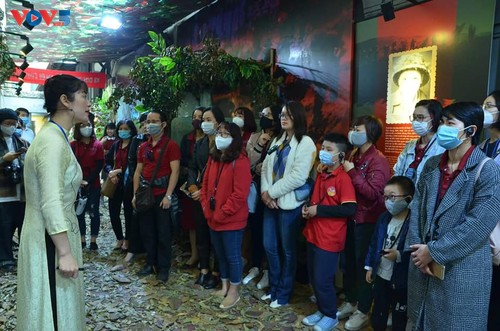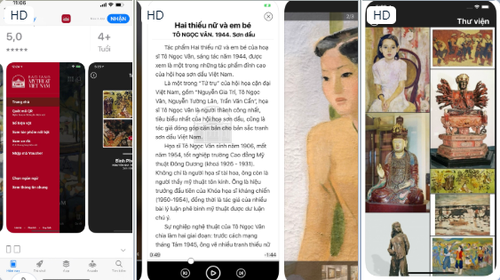 Visitors to Hoa Lo museum are provided with audio guide. (Photo: VOV5) Visitors to Hoa Lo museum are provided with audio guide. (Photo: VOV5) |
Digital technology has changed common perceptions of art and the way artistic and cultural events like exhibitions, concerts, and book fairs are organized. Traditional methods of archiving art works have been replaced with digital forms, resulting in better preservation of art works and easier public access.
“We’re living in a digital society amid the 4th Industrial Revolution where issues of digitization and big data impact every aspect of life, including the arts and culture sector. If we can digitize our data of arts and culture, this could become a valuable asset of Vietnam, which we can use in the long term for many purposes, while making it easier for the public to access it,” said Associate Professor Doctor Bui Hoai Son, Director of the Vietnam National Institute of Culture and Arts Studies (VICAS).
As AI flourishes, digitization has become inevitable. The COVID-19 pandemic has accelerated digitization in Vietnam.
"Due to the COVID-19 pandemic, Vietnam has no choice but to speed up its digitization. Many theatres around the world have launched their own websites and YouTube channels to give their audience free access to their shows. Museums worldwide have created free online exhibits of their precious collections," said Painter Nguyen The Son.
 The iMuseum app on smart phone. (Photo: VOV5) The iMuseum app on smart phone. (Photo: VOV5) |
Since last July, visitors have been able to take a 45-minute night-time tour of the Hoa Lo prison-turned-museum, part of Hanoi’s tourism promotion program during the COVID-19 pandemic.
“The night tour provides visitors with an audio guide that tells 35 stories about the artifacts on display and the patriotic prisoners who died in prison,” said Lai Thi Minh Thu, Deputy Head of the Research and Collection Division of the Hoa Lo Prison’s management board.
In 1997 the Vietnam National Institute of Culture and Arts Studies launched a national program to collect, preserve and promote intangible cultural heritages. The Institute has now digitized 480 scientific films, 10,000 photos, and 1,000 documentary tapes. These have helped Vietnam obtain UNESCO recognition of its cultural heritages, including the worship of the Hung Kings in Phu Tho province, the worship of Mother Goddesses in Nam Dinh province, and Vi and Giam singing in Nghe An and Ha Tinh provinces.
Vietnam has seen much digitization in its museums in recent years. The Vietnam Fine Arts Museum (VFA) and the Vietnam Mobile Application Software Joint Stock Company (VINMAS) launched the iMuseum VFA app, which enables virtual visits to the museum during the COVID-19 pandemic.
"To build this app, we studied big museums around the world, including the Met Museum in the United States, France’s Louvre Museum, the Dutch Rijksmuseum, and Singapore’s national museum. This is a multimedia application that uses high-quality audio, text, and photos to enhance tours of the VFA online or in person," said Cao Thai Hoang Uyen who is in charge of this project.
"The iMuseum VFA app has digitized 100 of the museum's most outstanding works. It works on both the Android and the iOS platform, using QR codes and iBeacon GPS technology. iMuseum VFA users can view high-quality images of art works, listen to expert descriptions, find the location of each exhibit, and view the diagrams and photos of the exhibition," she added.
Last August the Government approved a program on "Researching and creating a database and publishing Vietnamese literary and artistic works in the context of the Fourth Industrial Revolution", a key program for digitizing Vietnam’s cultural artifacts and promoting them to a wider audience.